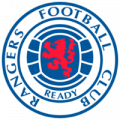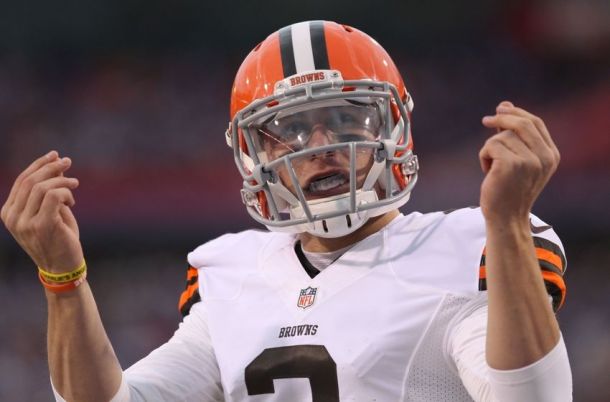In full disclosure, the view from this perch was that Johnny Manziel was never a top-flight NFL quarterback prospect. The opinion here, prior to the 2014 NFL draft, was that a small and slight quarterback who had not taking many snaps under center in college and who often threw off his back foot while scrambling would have a hard time excelling in the NFL. Frankly, the hype about Manziel, in the opinion of this writer, was ridiculous.
That's not to say he wasn't an intriguing prospect or shouldn't have been drafted. But the idea that he was a first round talent, let alone being the kind of prospect that pro football teams should drool over–as did Jon Gruden in an embarrassing display on draft day 2014–was, in one humble opinion, ludicrous.
Having said that, it would be easy to chortle over Manziel's ignominious rookie season. His lone start, apart from being a veritable act of surrender by a Cleveland team then in contention for the playoffs, was an embarrassment of epic proportions. However, that is solely from the football perspective. The football perspective is not what matters at this point.
As all the NFL world knows, Manziel has voluntarily checked himself into a rehab program. Although there is no official word, given his publicized activities over the past year and a half, it is safe to assume that it is for treatment for alcohol addiction. It would be easy to write his epitaph as a professional football player or to bask in his fall from grace, something the media and we as Americans traditionally love to do.
You will not read anything of that sort in this column, because Manziel has done something worthy of substantial praise for the first time since he has become a professional football player. Addiction is no respecter of persons. It is blind to their income, gender, race, creed, or any of the other classifications we insist on putting upon one another. We all know that. Having said that, we all also know that the most difficult step in treating any addiction is to admit that help is needed. Manziel has done this, and for that he should be loudly applauded.
Some might say that it is easy for a multi-millionaire with no real stress–as opposed to the superficial stress imposed by his own media grandstanding–to take this step when he knows he will have the support of family and many sympathetic fans. Those would also say that so many struggling with addiction are facing stress that pales in comparison with trying to show that you are worthy of the praise heaped upon you as a football player.
Try having an addiction when you come from a broken home or are working poor or are dealing with a terminally ill child. Indeed, sometimes the stress on addicted persons is so great that it is one of the causes of the addiction. Those sentiments may in fact be true, but are totally irrelevant in this scenario.
The fact of the matter is that addiction is a disease and, as such, all empathetic persons should no more glorify or condemn Manziel for having his than they would anyone else having a similar addiction. It is no different than condemning someone for having heart disease or diabetes. Some will say that the person with heart disease or diabetes could not avoid their condition, though this is not always true, while the alcoholic could simply choose not to drink.
Again, this might be true in theory and is logically akin to saying a homeless person should just get a house. Further, there are those who would say that with the importance of alcohol in our culture in general, not to mention the beer-hawking NFL in particular, the expectation for anyone to totally abstain is patently ridiculous.
The consumption of alcohol is encouraged and winked at in our culture, and there is nothing wrong with that to a point. However, those with addictions should not be overly condemned just to make those of us who do not have addictions, but choose to imbibe, feel better about ourselves. This doesn't change when the addict is a Heisman Trophy winner and a first-round draft pick of the Cleveland Browns.
There are those who are hoping that Manziel will beat his addiction, as superstars such as Brett Favre and Cris Carter did, and become an exceptional NFL player. There are others who hope he does not beat his addiction because they want to see him fail. Those people are not worthy of consideration or mention. The third group of people hope he beats his addiction, but are skeptical of him ever being an elite NFL quarterback for reasons purely based on his ability. This writer is in the last group. Notwithstanding whether or not Manziel ever lives up to his hype on the football field, he will have won a greater victory than any Super Bowl MVP if he can conquer his battle with alcohol and live a fulfilling and productive life.
The mere fact that he has the courage to admit this and to try to get help is a reason for all of us to stand up and applaud. That this is probably the first thing Manziel has done since becoming a pro that is worthy of applause is of no consequence. We should all cheer loud and long, with double the enthusiasm that we did when he won the Heisman Trophy, or was drafted in the first round by the Cleveland Browns. The step he is taking is more impressive than those two accomplishments put together.










































